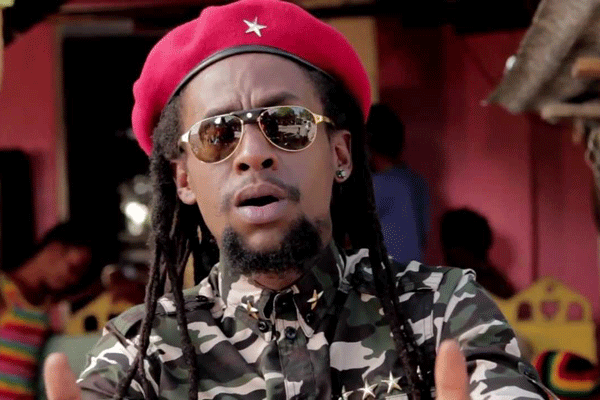
After their unpredictable, but successful adventure with Jah Prayzah and Diamond Platinumz at the Harare International Conference Centre (HICC) on December 2, local promoters, 2 Kings Entertainment have done it again. This time, they are roping in Siccaturies Alcock, aka Jah Cure to the same venue on Friday.
in the groove with Fred Zindi

In Jamaica they say if you believe in Jah Rastafari, then all your troubles, trials and tribulations are cured. According to one music critic at the Jamaican Gleaner, Jah Cure, also formerly known as “Little Melody”, has long been recognised for being “the possessor of the greatest voice ever given to a human being.” From the age of 11, that voice has hypnotised the souls of all who have heard it.
Born in Hanover, Jamaica on October 11 1978, Siccaturie, without the knowledge of his parents, used to sneak out of his bedroom window at night to visit local dancehalls and stage shows where he saw some of the great reggae icons perform — Bob Marley, Peter Tosh, Burning Spear, Beres Hammond, Marcia Griffith, Garnett Silk, Dennis Brown, Jacob Miller and Black Uhuru. Early in his life, he made the decision to become part of that elite group and dedicated his early years to making that dream his sole mission. Some of these icons such as Marcia Griffith, Bob Marley and Dennis Brown have in the past toured Zimbabwe and it is now grown up Jah Cure’s turn to do the same.
The Jamaican Gleaner adds that Capleton (that Jamaican dancehall artist who has graced Zimbabwe on two occasions, thanks to Mai Red Rose, Barbara Chikosi), was the one to bestow on Siccaturie the name Jah Cure. The symbolism was obvious — the singer looked young and healthy, well-preserved as in “cured,” using the plants of the land for medicinal purposes. It was during this time that Jah Cure became spiritually enlightened, learning the teachings of Rastafari and becoming a proponent of natural living.
Beres Hammond subsequently took Jah Cure under his wing and began mentoring him and producing for him in the studio. However, Jah Cure’s studio education and musical journey would be suddenly and unexpectedly interrupted. His growing success took a radical turn when he was stopped and arrested late one night in Montego Bay. He was charged with four crimes, one of which included sexual assault but all of which he vehemently denied. He maintained his innocence throughout his arrest and subsequent incarceration. A non-jury trial convicted him based on one victim’s claim that although she could not visually identify him, he sounded like one of the perpetrators and on that basis alone, he was sentenced to prison.
While in jail, Jah Cure recorded and released several songs, which became number one singles — Jamaica, which was produced by DZ Productions and Longing For which was produced by Don Corleon. Jah Cure’s first album, Free Jah’s Cure, was recorded and released approximately one year after he was incarcerated. It is a project that has been lyrically compared to Bob Marley’s Exodus.On that album, Jah Cure gives thanks for life, spreading love and forgiveness through his music. He believes his incarceration was Jah’s way of teaching him humility and love for his fellow men. He has since forgiven all those who judged him unjustly. While he was still in jail, Beres Hammond produced Jah Cure’s second album, Ghetto Life, which featured the single Divide and Rule, a duet with Sizzla, which was voted the best song of the year. VP Records compiled songs recorded during this period to release his third album, Freedom Blues, which featured King in This Jungle, another collaboration with Sizzla and the heartfelt Songs of Freedom.
As Jah Cure’s recordings overtook the global airwaves, many took up the call for his release. After numerous international appeals to the Jamaican government, Jah Cure became a free man on July 28 2007. On the day of his release and his first day of freedom, he stated that his only remaining goal for the rest of his life was to spread love and to promote peace and healing through his music. Cure said; “My struggles made me who I am today. That’s why I sing with feelings, it comes from my heart ‘cause I feel the pain. Who feels it knows it.” He is now happily married and the proud father of a beautiful little princess.
- Chamisa under fire over US$120K donation
- Mavhunga puts DeMbare into Chibuku quarterfinals
- Pension funds bet on Cabora Bassa oilfields
- Councils defy govt fire tender directive
Keep Reading
Since then, Jah Cure has topped the music charts numerous times, starting with Longing For and To Your Arms of Love from his fourth album True Reflections, as well as countless singles recorded for major independent producers. His sixth album, World Cry, suffered from numerous re-schedulings of its release, but still produced Unconditional Love, which shot to the top of the charts, becoming a number one reggae single worldwide. It also contained collaborations with Mavado, Rick Ross, Phyllisia and Jazmine Sullivan, crossing into hip-hop, Latin, pop and R&B genres.
Hit singles too numerous to mention followed, including the first release on his own Iyah Cure Productions label, That Girl and most recently the dancehall anthem Life We Live, which served to cement his reputation as an artist and producer to be taken seriously. He recently finished production of his seventh album, The Cure and has just completed a tour of Europe and South America.
This week the man who has been accorded the monicker, “High Priest Of Reggae”, performs in Brussels before making it to Zimbabwe on Friday.
It looks like another 2Kings Entertainment thriller is beckoning, as the promoters have informed me that some 3 000 advance tickets have been sold. Being a reggae enthusiast since the time of the king, Bob Marley, I will certainly be at the HICC this Friday.
Feedback: [email protected]











